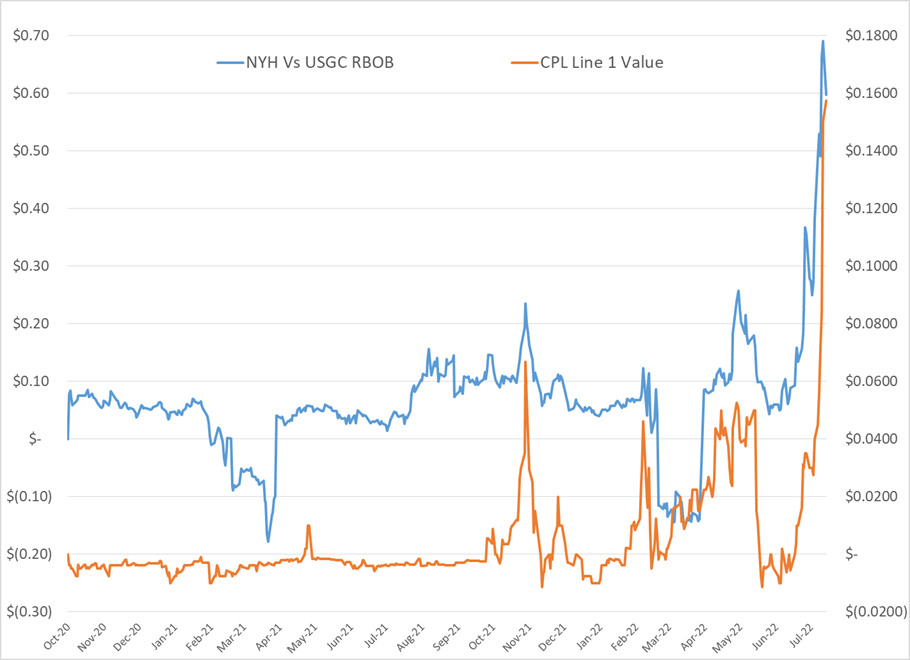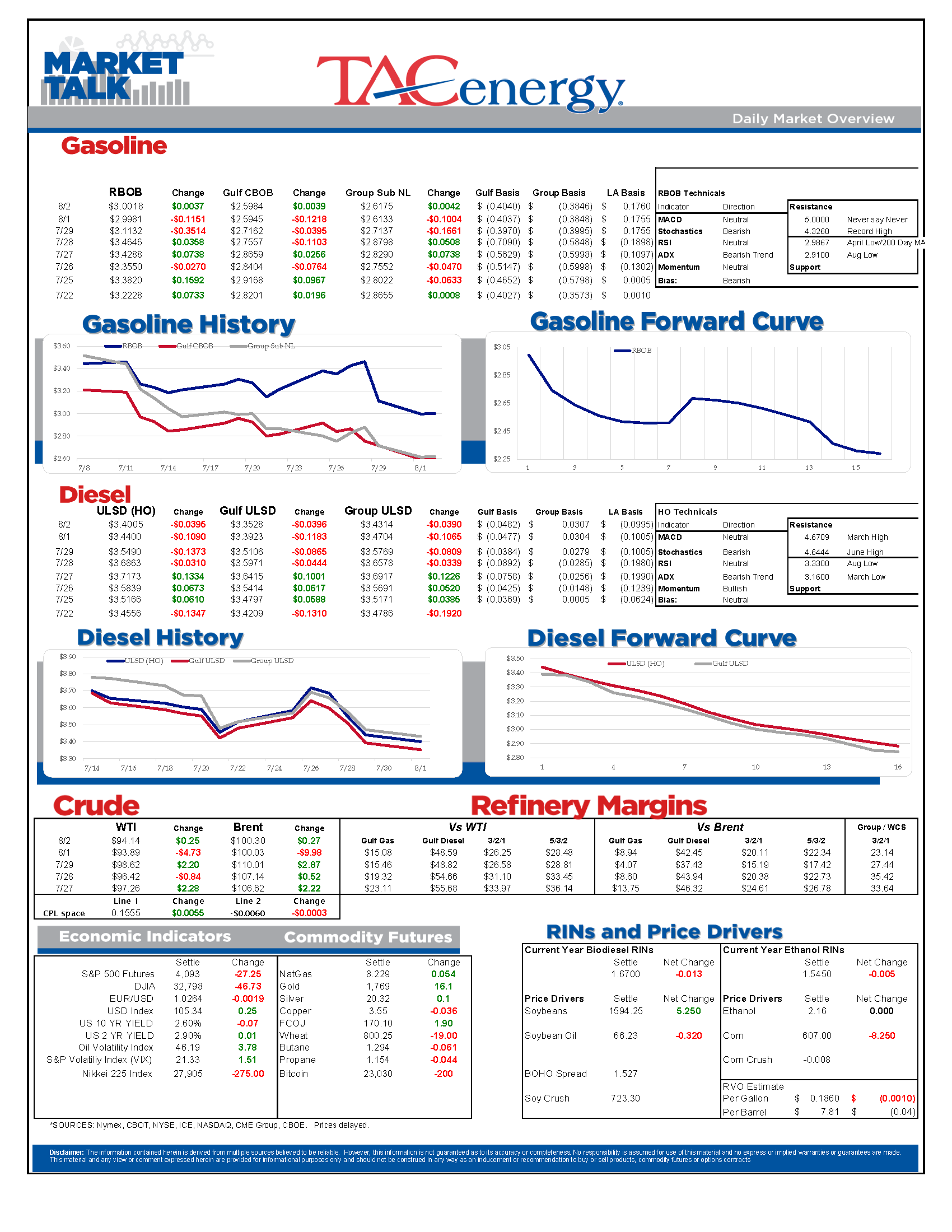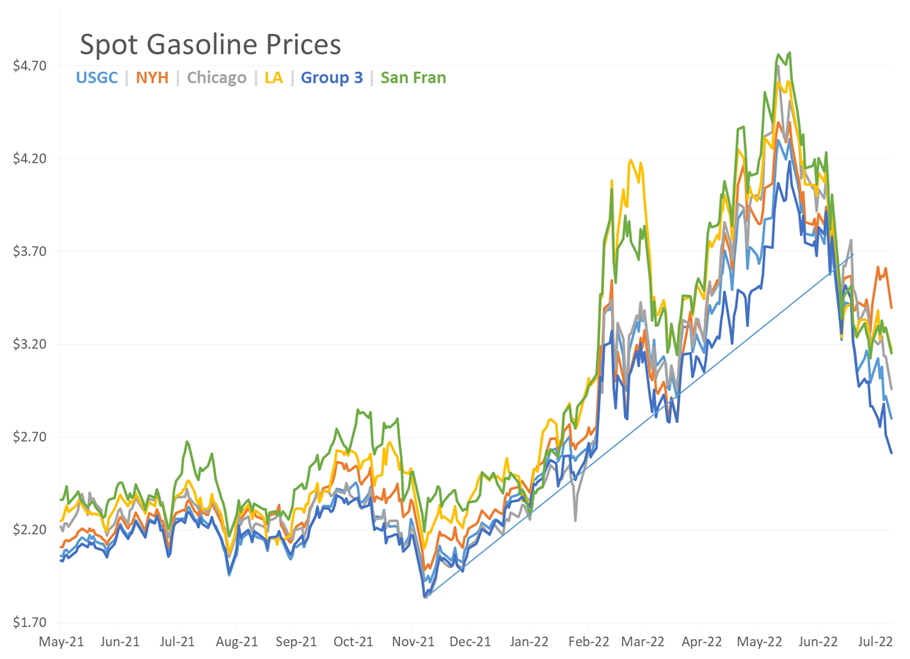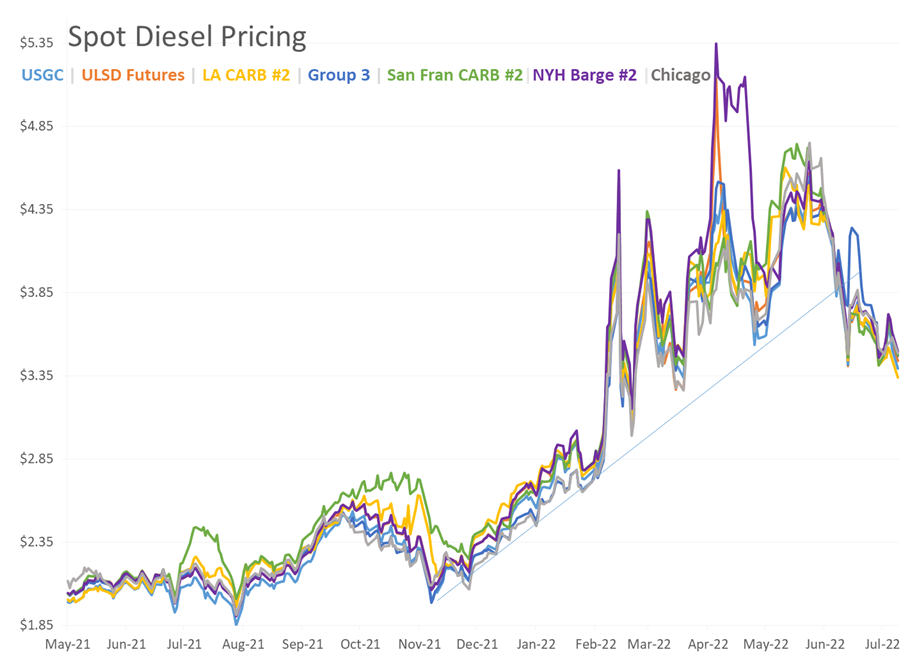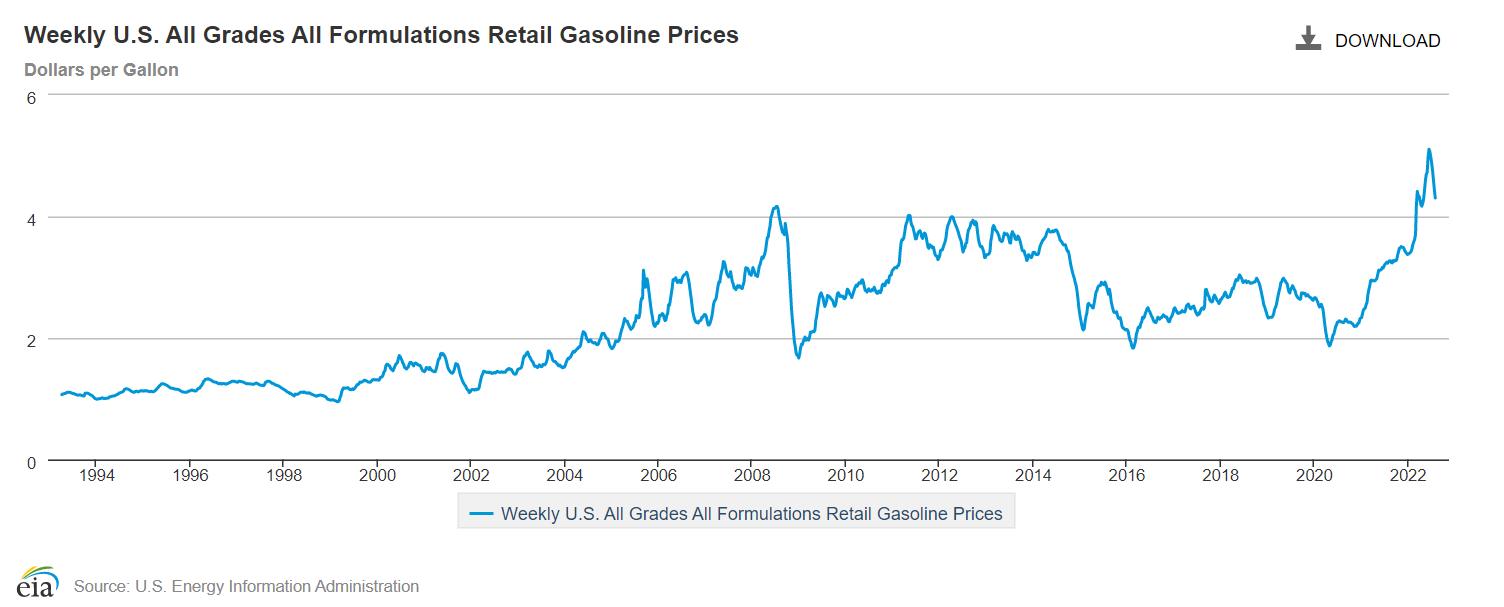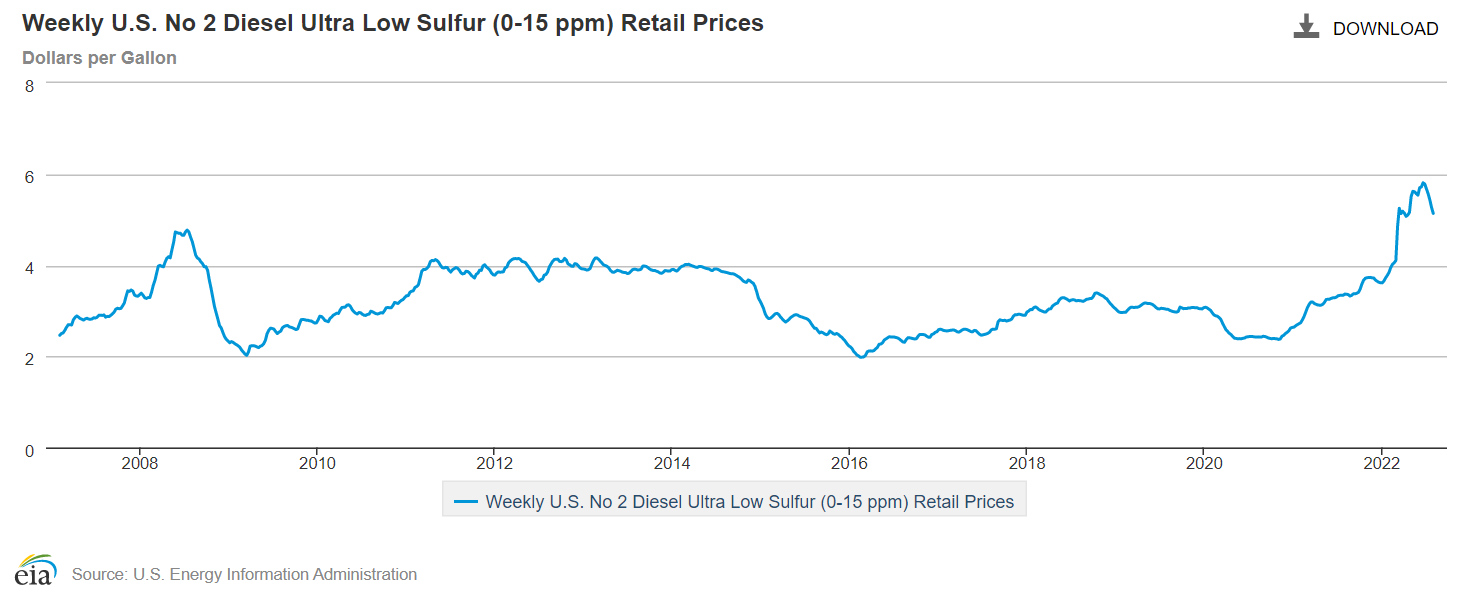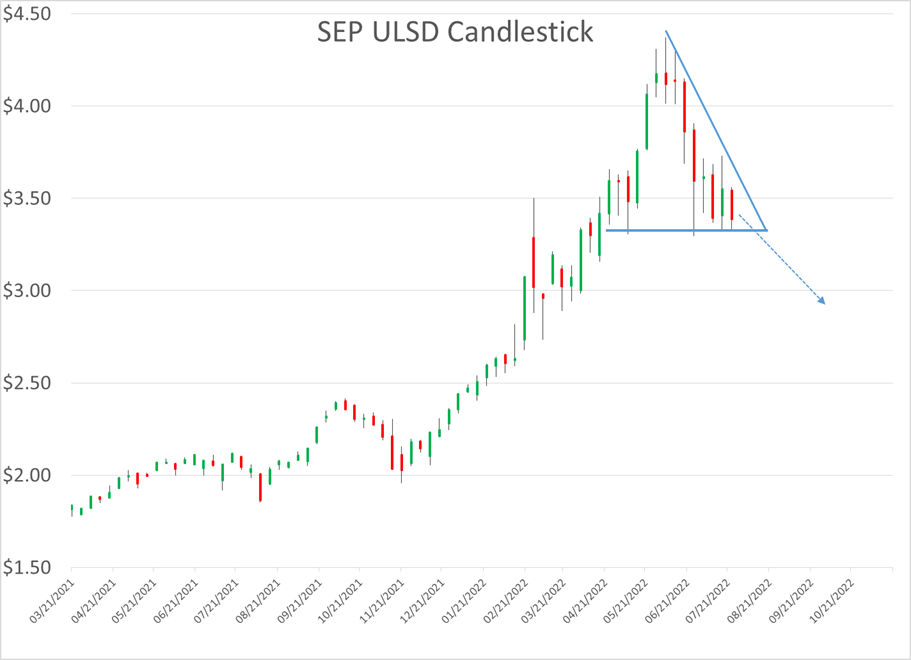Refined Product Prices Have Dropped To Their Lowest Levels In 4 Months As Fears Of A Slowing Economy
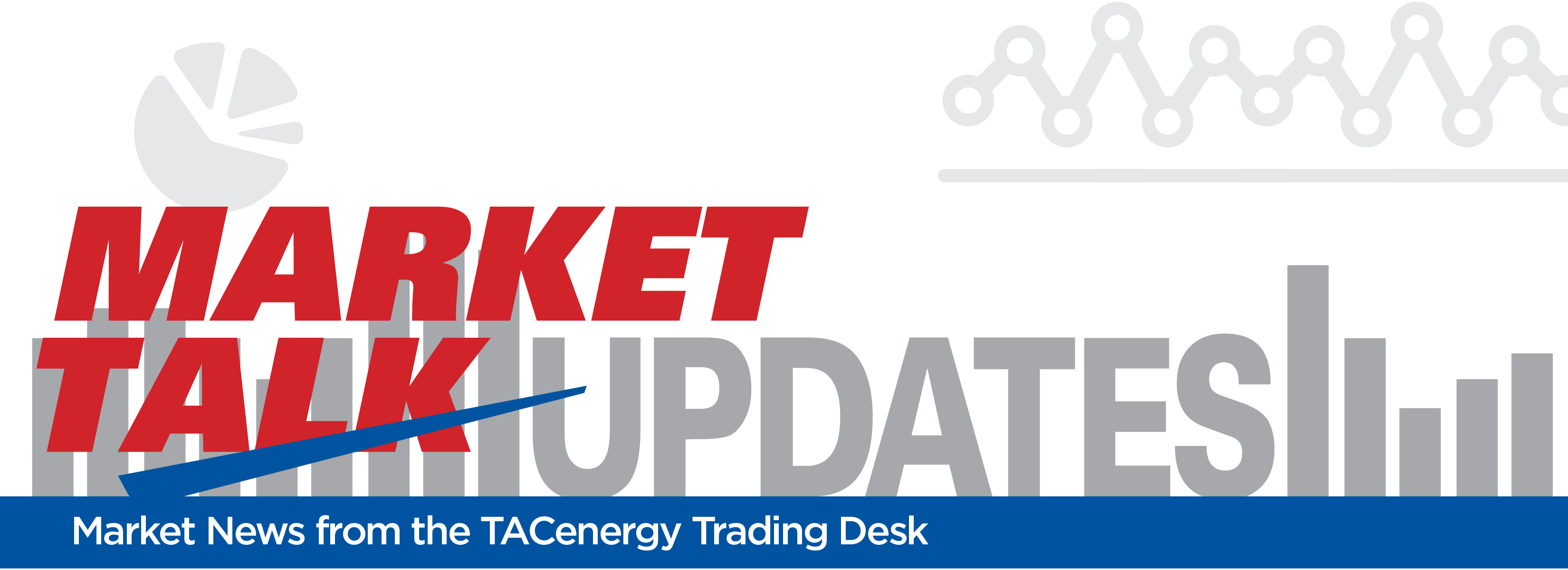
Refined product prices have dropped to their lowest levels in 4 months as fears of a slowing economy, and new tensions between the world’s two biggest economies, seem to be weighing heavily on various assets. The big drops this week have put the energy complex on the verge of a technical breakdown, but so far buyers continue to buy the dip, and keeping the chance of a continued sideways summer trading pattern intact.
Monday’s ISM Manufacturing survey got some of the credit for the big selloff in energy prices. Even though the survey showed that manufacturing in the US continued to grow, the pace was the slowest in 2 years, despite strong growth in energy production. The survey also suggested that post pandemic inventory restocking was winding down, which is likely to weigh on purchasing in the coming months. Right on cue, a Reuters article this morning notes that the country’s largest warehouse market is running out of room as consumer purchasing slows and inventories swell.
Retail fuel prices are set to continue dropping, and will soon be $1/gallon less than their June peak, which will be a key component to inflation readings decreasing. Perhaps the big question for the US economy, and energy prices for the rest of the year, is whether or not that drop in retail prices is enough to keep consumers from tightening their purse strings any further.
Diesel futures are potentially setting up a bearish descending triangle pattern on the charts, with a floor just below the $3.30 mark that could lead to a drop below $3 in the next few weeks should it break. Given the lack of diesel supplies globally, it’s hard to imagine this chart pattern could trump fundamentals, but relatively weak basis values across large parts of the US suggest we’re seeing at least a temporary reprieve in most of the inventory shortages, now we’ll just have to see if that lasts through the hurricane and harvest seasons.
The price to lease space on Colonial pipeline’s main gasoline line reached a 7.5 high this week as shippers race to take advantage of the huge premiums for gasoline in NY Harbor vs the US Gulf Coast. These premiums are yet another reminder of how the world’s supply and transportation network has been upended in recent months, after years of Colonial’s main line being unallocated and space trading for negative values since Europe was able to supply the excess gasoline consumed on the US East Coast. The forward price curve suggests the double digit premiums for line space will be short lived, but values could stay positive through the winter as that’s typically the strongest time of year as producers need to find new homes for their gasoline.
Click here to download a PDF of today's TACenergy Market Talk.
Latest Posts
Week 15 - US DOE Inventory Recap
Prices To Lease Space On Colonial’s Main Gasoline Line Continue To Rally This Week
Equity Markets Have Been Pulling Back Sharply In Recent Days As Inflation And Trade Concerns Inject A Sense Of Reality Into Stocks
Gasoline And Crude Oil Prices Reached Fresh Multi-Month Highs Friday Morning As News Of The Anticipated Attacks Spread
Social Media
News & Views
View All
Week 15 - US DOE Inventory Recap

Prices To Lease Space On Colonial’s Main Gasoline Line Continue To Rally This Week
Energy markets are sliding lower again to start Wednesday’s trading as demand concerns and weaker stock markets around the world seem to be outweighing any supply concerns for the time being.
Rumors continue to swirl about an “imminent” response by Israel to Iran’s attacks, but so far, no news seems to be taken as good news in the hopes that further escalation can be avoided, even as tensions near the Red Sea and Strait of Hormuz continue to simmer.
Prices to lease space on Colonial’s main gasoline line continue to rally this week, trading north of 11 cents/gallon as Gulf Coast producers still struggle to find outlets for their production, despite a healthy export market. Gulf Coast CBOB is trading at discounts of around 34 cents to futures, while Gulf Coast RBOB is trading around a 16-cent discount, which gives shippers room to pay up for the linespace and still deliver into the East Coast markets at a profit.
Back to reality, or just the start of more volatility? California CARBOB basis values have dropped back to “only” 40 cent premiums to RBOB futures this week, as multiple flaring events at California refineries don’t appear to have impacted supply. The state has been an island for fuel supplies for many years as its boutique grades prevent imports from neighboring states, and now add the conversion of the P66 Rodeo refinery to renewable diesel production and the pending changes to try and cap refinery profits, and it’s easier to understand why these markets are increasingly vulnerable to supply shocks and price spikes on gasoline.
RIN prices continue to fall this week, touching 44 cents/RIN for D4 and D6 values Tuesday, their lowest level in 6 weeks and just about a nickel above a 4-year low. While the sharp drop in RIN and LCFS values has caused several biodiesel and Renewable Diesel producers to either shut down or limit production, the growth in RIN generation continues thanks to projects like the Rodeo refinery conversion, making the supply in RINs still outpace the demand set by the Renewable Fuel Standard by a wide margin.
The API reported draws in refined products, 2.5 million barrels for gasoline and 427,000 barrels for distillates, while crude oil stocks had an estimated build of more than 4 million barrels. The DOE’s weekly report is due out at its normal time this morning.
Click here to download a PDF of today's TACenergy Market Talk.

Equity Markets Have Been Pulling Back Sharply In Recent Days As Inflation And Trade Concerns Inject A Sense Of Reality Into Stocks
It’s a mixed bag for energy markets to start Tuesday’s session with gasoline prices holding small gains, while oil and diesel prices show small losses as the world anxiously debates what comes next in the conflict, we’re still hoping we don’t have to call a war in the Middle East.
An early sell-off picked up steam Monday morning with refined products down more than a nickel for a few minutes, before reports that Israel was vowing to respond to Iran’s attack seemed to encourage buyers step back in an erase most of the losses for the day.
Equity markets have been pulling back sharply in recent days as inflation and trade concerns inject a sense of reality into stocks that had been flying high earlier in the year. The correlation between gasoline and crude oil prices had been fairly strong for the past couple of months but has since weakened as the weakness in stocks hasn’t yet trickled over into the energy arena. Both asset classes are seeing a tick higher in their volatility (aka Fear) indices this week however, and when fear starts driving the trade, we often see these prices move together.
Diesel has been underperforming the rest of the energy complex for most of the year so far, and those hoping for lower diesel prices got more good news when the Dangote refinery in Nigeria began loading diesel for domestic use Monday, in the latest milestone for the giant project that will have a major influence on Atlantic basin supply. Naturally, local lawmakers are already complaining that the refinery’s prices are too high.
The EIA this morning highlighted the record amount of crude oil China imported in 2023 after reopening the country post-COVID and after completing numerous new refinery builds in the past few years. Russia accounted for the largest increase in shipments to China last year, as China is one of the few countries that doesn’t mind ignoring sanctions. Speaking of which, the US House is expected to take up a new vote this week on sanctioning Chinese imports of Iranian crude, which the EIA notes are often hidden by relabeling the crude to make it appear as if it originated in Malaysia, Oman or the UAE.
We’re just 2 weeks away from the startup of Canada’s long-awaited Transmountain pipeline expansion that will bring roughly 600,000 barrels/day of capacity to the Pacific basin. That new outlet is great news for Canadian producers long restricted by takeaway capacity, and bad news for Midcontinent refiners who have grown accustomed to the discounted Canadian grades. A Bloomberg article Monday noted that Iraq’s Basrah Heavy crude is most likely to be displaced by West Coast US refiners who can now buy much closer to home.
Click here to download a PDF of today's TACenergy Market Talk.
